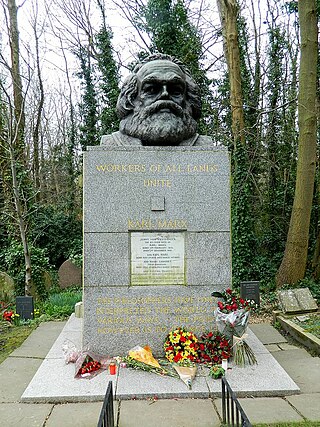Related Research Articles

The Fourth International (FI) was established in France in 1938 by Leon Trotsky and his supporters, having been expelled from the Soviet Union and the Communist International.
The Workers Socialist League (WSL) was a Trotskyist group in Britain. The group was formed by Alan Thornett and other members of the Workers Revolutionary Party (WRP) after their expulsion from that group in 1974.
James "Jock" Ritchie Haston (1913–1986) was a Trotskyist politician and General Secretary of the Revolutionary Communist Party in Great Britain.
The League for Socialist Action (LSA) was the premier Trotskyist organization in Canada for much of the 20th Century. Throughout its history the LSA went through many different names and iterations. In chronological order it was known as: the International Left Opposition (Trotskyist) of Canada, the Workers Party of Canada, the Socialist Policy Group, the Socialist Workers League, the Revolutionary Workers Party, The Club, the Socialist Education League, and the League for Socialist Action.
The International Revolutionary Marxist Centre was an international association of left-socialist parties. The member-parties rejected both mainstream social democracy and the Third International.
The Trotskyist International Liaison Committee was the international organisation established by the Workers Socialist League in Britain and its international co-thinkers in Italy, Denmark, the US and Turkey. It was founded in 1979.
Jimmy Deane was a British Trotskyist who played a significant role in building the Revolutionary Socialist League. Along with Jock Haston and Ted Grant, he played a role during the Second World War in the Revolutionary Communist Party, the British section of the Fourth International.
The Left Fraction, sometimes calling itself the Left Fraction, British Section of the Fourth International , was a Trotskyist organisation in the United Kingdom.
The Workers League was a small Trotskyist group in Britain.
The Labour Party Young Socialists (LPYS) was the youth section of the Labour Party in Britain from 1965 until 1991. In the 1980s, it had around 600 branches, 2,000 delegates at its national conferences and published a monthly newspaper, Left, later Socialist Youth. From the early 1970s, it was led by members of Militant.
The International Marxist Group (IMG) was a Trotskyist group in Britain between 1968 and 1982. It was the British Section of the Fourth International. It had around 1,000 members and supporters in the late 1970s. In 1980, it had 682 members; by 1982, when it changed its name to the Socialist League, membership had fallen to 534.
The Workers' International League (WIL) was a Trotskyist group that existed in Britain from 1937 to 1944.
The Workers Revolutionary Party is a Trotskyist group in Britain once led by Gerry Healy. In the mid-1980s, it split into several smaller groups, one of which retains possession of the name.

The Revolutionary Workers League (RWL) was a radical left group in the United States, lasting from 1935 through 1946. It was led by Hugo Oehler and published The Fighting Worker newspaper.
The Alliance for Workers' Liberty (AWL), also known as Workers' Liberty, is a Trotskyist group in Britain and Australia, which has been identified with the theorist Sean Matgamna throughout its history. It publishes the newspaper Solidarity.
The Revolutionary Communist Party was a British Trotskyist group, formed in 1944 and active until 1949, which published the newspaper Socialist Appeal and a theoretical journal, Workers International News. The party was the ancestor of the three main currents of British Trotskyism: Gerry Healy's Workers Revolutionary Party, Ted Grant's Militant tendency and Tony Cliff's Socialist Workers Party.
The Revolutionary Socialist League (RSL) was a Trotskyist group in Britain which existed from 1956 until 1964 when it became Militant, an entryist group in the Labour Party.

The Socialist Workers Party (SWP) is a Trotskyist party in the United States. Originally a group in the Communist Party USA that supported Leon Trotsky against Soviet leader Joseph Stalin, it places a priority on "solidarity work" to aid strikes and is strongly supportive of Cuba. The SWP publishes The Militant, a weekly newspaper that dates back to 1928. It also maintains Pathfinder Press.

Edward Grant was a South African Trotskyist who spent most of his adult life in Britain. He was a founding member of the group Militant and later Socialist Appeal.

Far-left politics in the United Kingdom have existed since at least the 1840s, with the formation of various organisations following ideologies such as Marxism, revolutionary socialism, communism, anarchism and syndicalism.
References
- ↑ Barberis, Peter; McHugh, John; Tyldesley, Mike. Encyclopedia of British and Irish Political Organizations: Parties, Groups and Movements of the 20th Century. A & C Black, 2000, p160
- Al Bornstein and Sam Richardson (1986), "Against The Stream" in The War and the International: A History of the Trotskyist Movement in Britain 1937-1949. London: Socialist Platform. ISBN 0-9508423-3-8